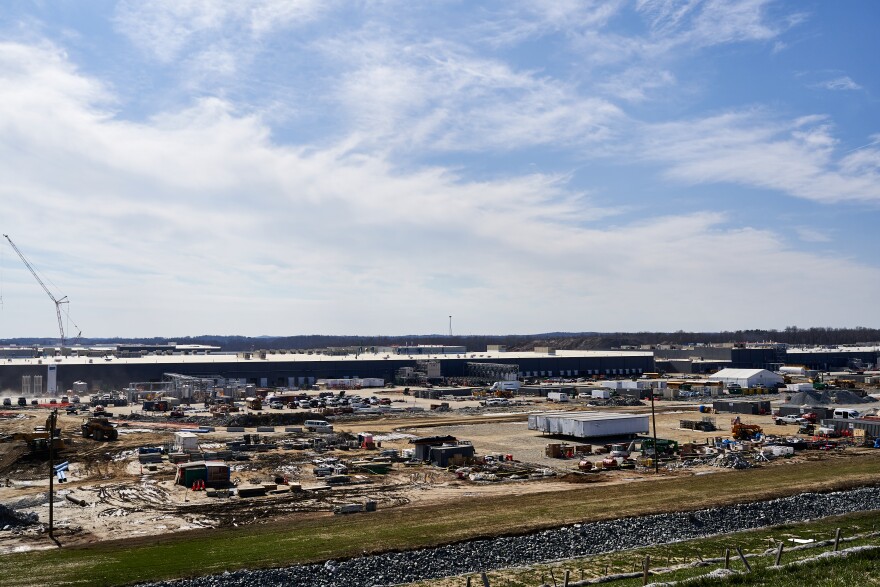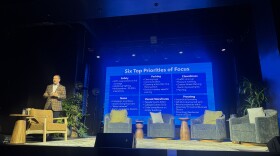When Asheboro furniture manufacturer Klaussner Home Furnishings abruptly closed in August, it left nearly 900 workers unemployed. One of them was Cassandra Hall, who faced the daunting prospect of somehow starting over at age 57.
“That was devastating,” she said. “I had been there for 20 plus years, and I ran the same machine almost the entire time I was there."
It was a familiar story. For decades across the southeast, manufacturing jobs — particularly in textiles and furniture — have been fading away.
This time though, the laid-off workers had a new option. Within a month, Hall found a job with better pay and a focus on the future of manufacturing rather than the past. She's now working with one of the world’s best-known companies: Toyota.
The giant Japanese carmaker is building its first plant to make batteries for electric vehicles — a $14 billion, three-million-square-foot behemoth — in the same county as her old factory, Randolph.
North Carolina is attracting a growing wave of new clean-energy companies, including several that have made it a key part of what's becoming known as an electric vehicle “battery belt" in the southeast.
In the process, these companies are reinvigorating a long-declining part of the state’s economy — manufacturing. Hall’s personal setback, and turnaround, in some ways mirror the fortunes of the county.

EVs power an economic resurgence
In 2008 after a string of plant closings, the Randolph County seat, Asheboro, suffered an economic development nightmare. Forbes magazine named it one of the nation’s fastest-dying towns. Four years later, the CBS news show 60 Minutes followed with another similar story.
"Fast forward 10, 12 years, and here we are with more investment than any other community in the country could hope to receive,” said Kevin Franklin, the county’s economic development director.
Toyota plans to hire more than 5,000 workers, and state and local officials expect the wages to be significantly higher than the county average. The plant is expected to nearly double the county’s property tax base. And Franklin said Toyota’s arrival is prompting other companies, large and small, to consider sites in the county.
“We’re on the cusp of a lot of opportunity," Franklin said. "Population growth, business growth, industrial growth, directly and indirectly related to Toyota.”
He added: “There's been a significant, significant turnaround. Now, that's not to say that some of those textile and furniture companies aren't still perhaps struggling a little bit. But what a change.’
And what a change for the state, which had lost nearly half its manufacturing jobs — more than 400,000 of them — between 1994 and 2010.
Now, state commerce officials say they expect the nearly two dozen “clean energy” projects announced since 2017 to directly add nearly 18,000 jobs.
Just the three largest could add more than $100 billion to the state’s economy over the next few decades.
Besides Toyota, the companies that are part of the electric vehicle industry include Vietnamese carmaker VinFast, which has broken ground on a factory in Chatham County. Progress has been slow amid questions about the company’s finances, but it would bring about 7,500 jobs if the company builds it as proposed.
Among the others in the works are a Japanese battery component plant in Davidson County, an Indian battery materials processor near Wilmington, and even an electric boat factory near Asheville.
They are part of a growing phenomenon.
Giulia Siccardo of the U.S. Department of Energy said a kind of critical mass effect has taken hold across a growing “Battery Belt” in the Southeast, as the region attracts companies at different points in the supply chain.
The states are attractive to such companies, she said, in part because they are so-called right to work states -- where laws make it hard to organize strong unions.
“They also have a legacy of manufacturing and manufacturing complex environments and had already drawn some of the large automakers mostly outside of the big three to create manufacturing capacity there,” she said.
She said all the companies locating relatively close together can help drive down the price of EVs, which generally are more expensive than gas-powered vehicles.
Aggressive government incentives help attract companies
Michael Walden, a professor emeritus at N.C. State University, said the state attracts new companies because of its relatively affordable cost of living, good quality of life, and vigorous inflow of newcomers.
“If you look at state demographers forecasts, we're going to grow at about twice the rate as the nation and population over the next several decades," Walden said. "So we're going to have a growing labor supply.”

Automakers were already comfortable with the region because many of them had looked at various sites — and in some cases chose them — in the past few decades. BMW has a plant in South Carolina and Mercedes in Alabama, for example.
Toyota and Mazda looked at Randolph County in 2018 for a joint vehicle plant. They eventually settled on Alabama instead, but Sean Suggs — who as president of Toyota Battery Manufacturing, North Carolina is in charge of the new factory — said Toyota found much to like when it looked at the state.
“The thing that we were really, really interested in and we felt like we can capitalize on was the human capital in the people, the talent pool that they had here, mainly driven a lot by their school systems, their college systems,” Suggs said.
North Carolina's 58-school community college system works closely with employers to tailor worker training. Randolph Community College is planning a 22-acre satellite campus near the factory to train workers for Toyota and other manufacturers.
The community college training initiatives are part of the package of state and county incentives for Toyota. Those could total up to $750 million, provided the automaker hits employment and investment targets.
All told, North Carolina has offered incentives to about two dozen clean energy projects announced since 2017. And the Biden administration is pumping federal money into clean energy initiatives, including a proposed mine for lithium – a key battery ingredient – at Kings Mountain west of Charlotte. Two international mining companies have been working to open lithium mines here.
'This isn't Henry Ford's assembly line'
The jobs the clean energy manufacturing companies are bringing bear little resemblance to the stereotypes of traditional manufacturing.
Toyota is already training workers at a simulated small-scale production facility inside a Greensboro office building. There’s a mock-up of the airlocks that will protect the clean rooms where batteries are assembled. Visitors have to pull on smocks, safety glasses, gloves, and rubber booties and get a 15-second “air shower.”
Inside the simulated clean room, workers practice on small versions of the equipment they’ll run in the factory.

“This isn't Henry Ford's assembly line, right?” said Jennifer Mundt, the state’s assistant secretary of clean energy economic development.
“We're talking about clean manufacturing floors, where you're not going to be covered in grease and grime from the work that you're doing. A lot of that requires precision, automation, and understanding of robotics and ... tools to help the work get done on the floor.”
Toyota isn’t releasing pay information about salaried jobs at the plant but said starting pay for hourly jobs ranges from $18 to $42 an hour, depending on position. That doesn’t include bonuses, which are a routine part of the company’s compensation.
“These are family-sustaining wage jobs that will help support and provide for economic mobility, especially in places across the state that have been underserved,” Mundt said.
The factories themselves aren’t always going in rural areas. The Vinfast plant will be close to Raleigh, for example. And while the town of Liberty, where the Toyota plant is being built, is tiny, it’s close enough to Greensboro that the city is providing the water and sewer service.
But some are so large their effects will ripple across several counties.
The three largest projects — Toyota, VinFast and a Wolfspeed plant to make material for energy-saving semiconductors — are in counties tied together by U.S. Highway 64, a fact that caught the eye of Walden, the NCSU economist.
He said that may point the way to an approach to spread economic benefits more widely.
“If you assume a person can commute easily 30 or 45 minutes to a job, I think this is a perfect example of how you can utilize the location of these firms to really be impactful on this slice of rural counties in North Carolina,” he said. “Something that may be able to be replicated in other parts of our state.”
Back in Randolph County, another of Toyota's new employees is 26-year-old Evito Perez. He quit his job at a furniture maker just over the county line in Siler City to step into what he sees as the future.
“It’s something different and seeing something so technologically advanced is coming up to North Carolina, it’s something that you want to be a part of,” Perez said. “It's a new experience.”



















